

Failures of the League of Nations. Hitler's role part 2. Hitler's role part 1. A BIT MORE DETAILED. World War Two began in September 1939 when Britain and France declared war on Germany following Germany's invasion of Poland.
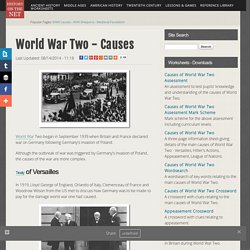
Although the outbreak of war was triggered by Germany's invasion of Poland, the causes of the war are more complex. Treaty of Versailles In 1919, Lloyd George of England, Orlando of Italy, Clemenceau of France and Woodrow Wilson from the US met to discuss how Germany was to be made to pay for the damage world war one had caused. Woodrow Wilson wanted a treaty based on his 14-point plan which he believed would bring peace to Europe. Georges Clemenceau wanted revenge. EXCELLENT OVERVIEW! Snappy Description of the main causes. The causes of World War Two can be divided into long term causes and short term causes.
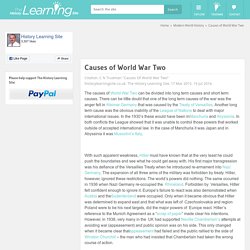
Japan invades Manchuria: 1931. JAPANESE CONQUEST OF MANCHURIA 1931-1932. Attack of September 18, 1931 ON SEPTEMBER 18, 1931 Japan launched an attack on Manchuria.
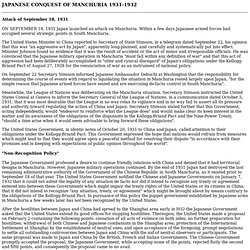
Within a few days Japanese armed forces had occupied several strategic points in South Manchuria. The United States Minister to China reported to Secretary of State Stimson, in a telegram dated September 22, his opinion that this was "an aggressive act by Japan", apparently long-planned, and carefully and systematically put into effect. Japan's Military Aggression in East Asia 1931 -1937. While Japan was giving the appearance of being a good neighbour in the western Pacific during the 1920s by involvement in treaties designed to preserve peace, extremist elements in Japan's government, military and civilian population had privately never renounced the use of force to expand Japan's territory.
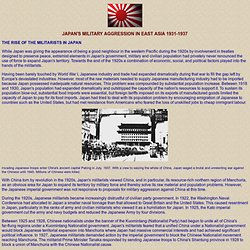
Towards the end of the 1920s a combination of economic, social, and political factors played into the hands of the militarists. Having been barely touched by World War I, Japanese industry and trade had expanded dramatically during that war to fill the gap left by Europe's devastated industries. However, most of the raw materials needed to supply Japanese manufacturing industry had to be imported because Japan possessed inadequate natural resources. This problem was compounded by substantial population increase. Between 1918 and 1930, Japan's population had expanded dramatically and outstripped the capacity of the nation's resources to support it. Kellogg-Briand Pact. The Kellogg-Briand Pact was a multilateral treaty, which renounced aggressive war and prohibited the use of war as a national policy, unless it was for the purpose of self defense.
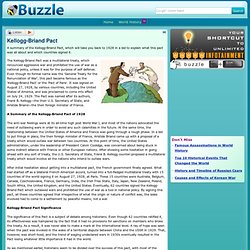
Even though its formal name was the 'General Treaty for the Renunciation of War', this pact became famous as the 'Kellogg-Briand Pact' or the 'Pact of Paris'. It was signed on August 27, 1928, by various countries, including the United States of America, and was proclaimed to come into effect on July 24, 1929. The Pact was named after its authors, Frank B. League of Nations and Racial Equality. An interesting chapter in the book “ Paris 1919: Six Months That Changed the World ” is related to Japan.
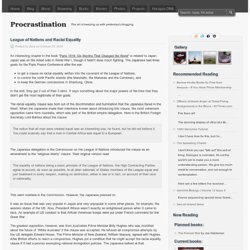
Japan was on the Allied side in World War I, though it hadn’t done much fighting. The Japanese had three goals for the Paris Peace Conference after the war: to get a clause on racial equality written into the covenant of the League of Nations, to control the north Pacific islands (the Marshalls, the Marianas and the Carolines), and to keep the German concessions in Shantung, China. In the end, they got 2 out of their 3 aims. It says something about the major powers of the time that they didn’t get the most legitimate of their goals. Why G Hated ToV. Summary The Germans hated the Treaty of Versailles because they had not been allowed to take part in the Conference.
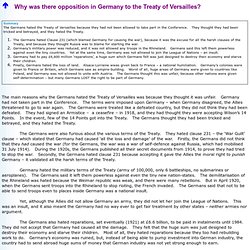
They thought they had been tricked and betrayed, and they hated the Treaty. The Germans hated Clause 231 (which blamed Germany for causing the war), because it was the excuse for all the harsh clauses of the Treaty, and because they thought Russia was to blame for starting the war. Germany’s military power was reduced, and it was not allowed any troops in the Rhineland. Germans said this left them powerless against even the tiny countries.
Stab-in-the-back legend. The stab-in-the-back myth ( Dolchstoßlegende )[1] is the notion, widely believed in right-wing circles in Germany after 1918, that the German Army did not lose World War I but was instead betrayed by the civilians on the home front, especially the republicans who overthrew the monarchy.
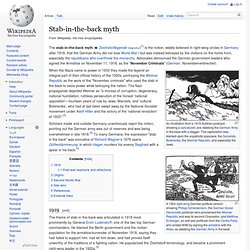
Advocates denounced the German government leaders who signed the Armistice on November 11, 1918, as the "November Criminals" (German: Novemberverbrecher). When the Nazis came to power in 1933 they made the legend an integral part of their official history of the 1920s, portraying the Weimar Republic as the work of the "November criminals" who used the stab in the back to seize power while betraying the nation.
What were the consequences of the war guilt clause. The Palestine Mandate. From World War I Document Archive WWI Document Archive > Post - 1918 Documents > Conventions and Treaties > Palestine Mandate Extracted from: The Israel-Arab Reader, edited, Walter Laqueur, New York, Bantam Books, 1976, pps 34-42.
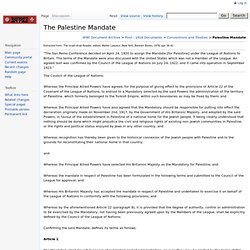
League of Nations. Background.
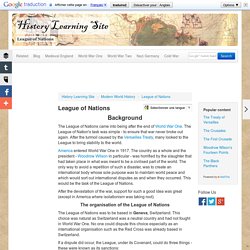
13-1c - The Interwar Period.mov. 13-1d - The Interwar Period.mov. 13-1e - The Interwar Period.mov. 1930s in Australia. The Great Depression severely affected Australia. The Wall Street stock market in New York had crashed in the previous year. The collapse of international commodity prices, including wheat and wool in the late 1920s, meant that the heavy debts run up by federal, state and territory governments were almost impossible to pay off at the previously agreed rate.
Some politicians argued that the loan repayments shouldn't be made as the money would be better used creating local jobs. Other politicians said that the most important thing was Australia's financial standing and the debts had to be repaid or else the nation would be declared insolvent. Surviving the Great Depression - ABC Sydney - Australian Broadcasting Corporation.
The Museum Of Sydney is hosting a new exhibition called 'Skint: Making Do in the Great Depression'. QUENTIN DEMPSTER, PRESENTER: In the 1930s during the Great Depression, one in three Australian breadwinners was unemployed. It was a time of great hardship and one that makes the current Global Financial Crisis pale by comparison. This weekend a new exhibition called 'Skint: Making Do in the Great Depression' opens at the Museum of Sydney. C Germany 1918-1939. Syllabus | Exams | Websites | Resources | Glossary | Teachers Modern History Home > Modern History > National Studies > C Germany 1918-1939. Australia's Wartime History - Digital Education Resources. Australia's Wartime History - Digital Education Resources. International Relations 1919. The League of Nations Wilson was more bothered about the League than about anything else. The League was his ‘parliament’ which would solve international disputes by discussion, and would do away with war.
The Road to War: Germany: 1919-1939. The Czechoslovakia Crisis & Munich Agreement, September 1938 Hitler next set his sights on the Sudetenland of Czechoslovakia. After the Anschluss, Czechoslovakia now bordered Greater Germany on three sides. As in Austria, many citizens in the Sudetenland were Germanic people who advocated for union with Germany. Negotiations took place over the summer. Czechoslovakia had a well-trained army, but was reluctant to fight against Germany without Western help. France, however, was particularly unprepared for war, and so it was up to British Prime Minister Neville Chamberlain to take the diplomatic lead. The real crisis began on September 12. Finally, on the 21st, Czechoslovakia gave in. The Decline of Australian Naval Deterrence 1919-1939. The Commonwealth Naval Forces inherited a motley collection of obsolescent coastal and harbour defence vessels when the State navies transferred to Commonwealth control on 1 March 1901.
The Interwar Years (1919-1938) Inter-War Period, 1919 - 1939.